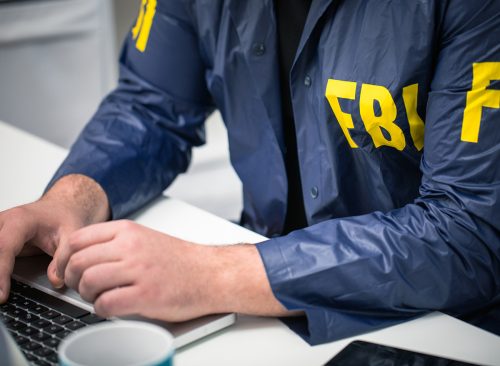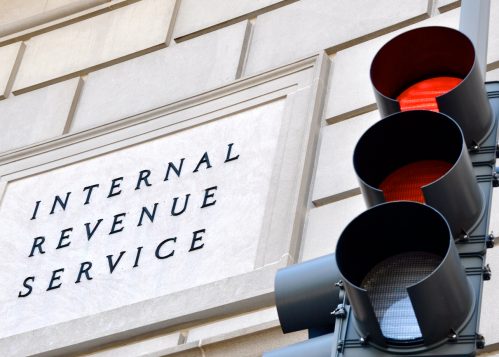FBI and IRS Issue Urgent New Warnings on Holiday Scams and How to Avoid Them

The holiday season puts many of us in the sharing spirit. But if you’re looking to give back to your loved ones this winter, be careful that you’re not inadvertently giving to scammers, too. Con artists know that this is a good time to capitalize on people’s gifting and charitable efforts, and they’re not afraid to use your Christmas cheer against you. Now, the Federal Bureau of Investigation (FBI) and the Internal Revenue Service (IRS) are both sharing urgent new warnings about holiday scams. Read on to discover how you can avoid becoming a victim.
RELATED: If a Caller Asks You Any of These Questions, Hang Up Right Away, Officials Warn.
The FBI is warning about gift card scams.

In an interview with Fox 5 Atlanta, the city’s local FBI branch warned that rising scams could put people out of hundreds of dollars this winter.
“These are huge numbers that we are looking at,” Jenna Sellitto, a spokesperson for FBI Atlanta, said. “People need to be aware where they’re shopping, where they’re putting their credit cards in.”
In a separate interview with Atlanta News First, Sellitto said that many con artists will try to use gift cards to scam people over the holidays.
“They leave the store with them, take off the foil, and get the numbers on the back. They input those number into a database. Then they bring the gift cards back,” she explained
Once you buy a fraudulent gift card and put money on it, thieves are alerted and can wipe the balance.
RELATED: 8 Holiday Scams to Watch Out For, FBI Says in New Warning.
And the IRS is offering a broader warning.

It’s not just your hard-earned money you need to be worried about during the holiday season. In a Nov. 27 press release, the IRS issued an alert about how criminals could also be trying to get their hands on your personal information right now.
“As the holidays and tax season approach, this special week highlights that we are entering a period where taxpayers need to be extra careful protecting their sensitive financial and personal information,” IRS Commissioner Danny Werfel said in a statement.
According to the agency, scammers are using “evolving scams and schemes” that are designed to steal your personal, financial, and tax information.
“Identity thieves are looking for ways to play the Grinch and steal taxpayer information that can help them steal identities and file fraudulent tax returns,” Werfel explained. “The IRS and the Security Summit continue to work to strengthen our internal systems, but taxpayers and tax professionals form a critical first line of defense against identity thieves by securing their tax and financial information.”
RELATED: FBI Issues New Warning About the Latest Scams Designed to “Steal Your Money.”
There are several ways you can protect your money.

Certain money-stealing schemes, such as those involving gift cards, really ramp up over the holidays, according to the FBI. The best way to avoid falling victim is to know what you should be watching out for when it comes to these cons.
“When you’re looking at gift cards, check them, check them for physical tampering,” Sellitto told Atlanta News First. Those that have been compromised might look “like part of it has been scratched off or it’s not on there all the way,” according to the FBI agent.
In a previous alert about gift card schemes, the FBI also advised consumers to cross-check the gift card’s barcode number with the number on the packaging itself to make sure it matches.
“Don’t purchase if the barcode is on a sticker, or if the package is ripped, wrinkled, bent, or looks tampered with,” the agency added.
You should take extra steps to keep your personal information safe, too.

Your personal information is most at risk when you’re shopping online or clicking emails and texts, “especially during the holiday season when criminals are active,” according to the IRS. To help keep yourself safe while searching for gifts this winter, the agency said there are several extra steps you need to take with your technology.
“Shop at sites where the web address begins with ‘https,'” the IRS advised. “The ‘s’ is for secure communications and look for the padlock icon in the browser window.”
The agency said you should also avoid shopping on “unsecured public Wi-Fi,” which may be found in places like malls or restaurants. And make sure your devices, and the ones of less tech-savvy family members, are able to handle potential threats.
“Keep security software for computers, tablets and mobile phones updated. Make sure anti-virus software for computers has a feature to stop malware, and that there is a firewall enabled that can prevent intrusions.,” the FBI cautioned. “Use strong and unique passwords for online accounts, [and] use multi-factor authentication whenever possible. It helps prevent thieves from easily hacking accounts.”
RELATED: For more up-to-date information, sign up for our daily newsletter.